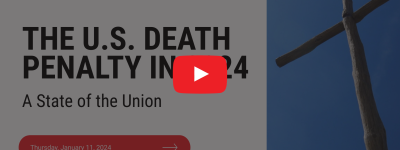
In light of the Louisiana legislature deciding whether it will abolish the death penalty during the 2018 session, the Louisiana Interchurch Conference released its stance on the death penalty, calling this act of state sanctioned violence "The most draconian of all punishments which violates the dignity and sanctity of human life and diminishes us all."
See below for the full statement.
LIC RESOLUTION AGAIN REAFFIRMING LIC’s OPPOSITION TO THE DEATH PENALTY,
March, 2018
In the 2018 Louisiana Legislative Session our state lawmakers have the opportunity to take the historic step of ending the death penalty in Louisiana, the most draconian of all punishments which violates the dignity and sanctity of human life and diminishes us all. With this Resolution the Louisiana Interchurch Conference again reaffirms our opposition to the death penalty and our support of legislation ending forever the practice of state-sanctioned killing in Louisiana.
People of the Gospel must reject capital punishment as a way of dealing with crime because death does not restore, heal, or make whole what was lost--death only causes more death. When the state imposes death as a sentence, a further insensitivity to the loss of life is the result. The death penalty makes it easy to give up on others and neglect the underlying causes which yield violence and death. As a people of the Gospel of Life, we are instead called to build a civilization of life and love and mercy.
On Good Friday, the most solemn day in the Christian calendar, we are reminded how Jesus, the totally innocent One, forgave his persecutors at whose hands he was suffering an agonizing and humiliating death. Throughout the Gospels there is a repeated insistence on the critical importance of mercy and forgiveness to those who sin against us. It is not a peripheral matter in the Christian faith, but rather the core of what it means to take on the mind of Christ. Why Christ’s insistence on forgiveness? So that we may be rescued from the deadly consequences of refusing to forgive—bitterness, alienation, resentment, and vengeance.
The death penalty is premised on vengeance and retribution, not redemption. Furthermore, the application of the death penalty is highly prone to errors and is often biased by race, the quality of legal representation, and the locality of the crime. Since 1976, 82% of death penalty convictions have been overturned in Louisiana, the highest rate of reversal in the U.S. Several studies have shown that the one of the most decisive factors in who is prosecuted for the death penalty is the race of the victim. Too often who lives and who dies depends upon geography-- forty-two of Louisiana’s 64 parishes have not returned a death sentence since 2000.
The death penalty absorbs much needed resources that would be better used to prevent crime and increase public safety. There are much less costly alternatives that both punish offenders and protect society.
In his speech before Congress Pope Francis reminded our nation’s leaders of their responsibility to protect and defend human life at every stage of its development. He rejected the death penalty as an affront to the dignity and sanctity of human life and because a just and necessary punishment must never exclude the dimension of hope and the goal of rehabilitation.
Christians are an Easter people—our faith is rooted in the hope of mercy and resurrection. Jesus’ death on the cross transformed all suffering and pain by refusing to pass it on. The Resurrection secured the promise of eternal life. It is this paschal mystery, this Easter faith, that we are called to live each day, drawing upon the limitless love of God to fortify us against the temptation of fear. Let us no longer succumb to the fear and hopelessness that the death penalty represents.
We pray that in the 2018 Legislative Session our legislators have the courage and wisdom to end the death penalty in Louisiana.
The Louisiana Interchurch Conference is a statewide ecumenical organization formed in 1970 to further the aims of Christian unity, service, and witness to Faith and Social Justice in Louisiana and the region. The LIC includes 16 member denominations and 28 affiliate Judicatory leaders, representing almost 2 million individual congregants statewide



